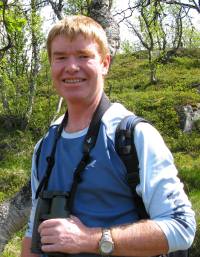S.T. Lee Lecture 2011

Lion griefs in the shade: Global change biology in the Antarctic
Professor Steven Chown, 08 September 2011
Centre for Invasion Biology, Stellenbosch University, South Africa
View the talk here: 2011 S.T. Lee Lecture
Synopsis of lecture
Untroubled times are those we yearn most for. They make life simpler and we profit by them. Many would have us living in such times, human ingenuity ensuring them into the future, and the need for swift and difficult action to address major environmental challenges less pressing. Yet much of modern science paints a bleaker picture: one that calls for an immediate response, which will make life less comfortable in the short term. The signals of rapid environmental change are clear and ubiquitous. Even apparently pristine biological systems, such as those of the terrestrial Antarctic, are showing evidence of such change. Across the region the signs of impact from the major environmental change drivers and their synergies are becoming more noticeable. Climate change is making many terrestrial areas more hospitable for indigenous organisms and for species from temperate areas. Distributions are changing rapidly, with the greening of areas that were previously free of closed vegetation making habitat change a significant consideration for the region. Warming in many areas is also benefitting non-indigenous over indigenous species, so realizing the forecasts of synergy among these global change drivers. Although conservation management is feasible in many instances, the consequences thereof are frequently unanticipated. In a world that is increasingly pre-occupied with adaptation to change, much of the biology shows that wherever possible, mitigation remains the preferable option. Such mitigation is only feasible when the core problem is recognized and accepted.
Steven Chown
Steven L. Chown is Director of the DST-NRF Centre of Excellence for Invasion Biology and Professor of Zoology at Stellenbosch University, South Africa. He has worked in the Antarctic region for more than 25 years, with much of his research focusing on biodiversity and its response to climate change, biological invasions, and their interactions. The research group he leads and the Centre he directs focus on similar questions in Africa, the Antarctic and elsewhere. He has trained 27 Masters and 17 Doctoral students, and has published widely, including more than 290 peer-reviewed scientific papers. His publications further include two scientific books, and four popular volumes on the Southern Ocean Islands. He has contributed substantially to domestic conservation and science policy, and to Antarctic conservation policy through the Scientific Committee on Antarctic Research and the Antarctic Treaty System. He has been awarded the Zoological Society of Southern Africa’s Gold Medal, the South African Antarctic Medal, the British Association Medal of the South African Association for the Advancement of Science, and he is the inaugural recipient of the Martha T. Muse Award for science and policy in Antarctica.
